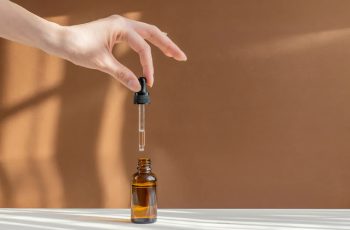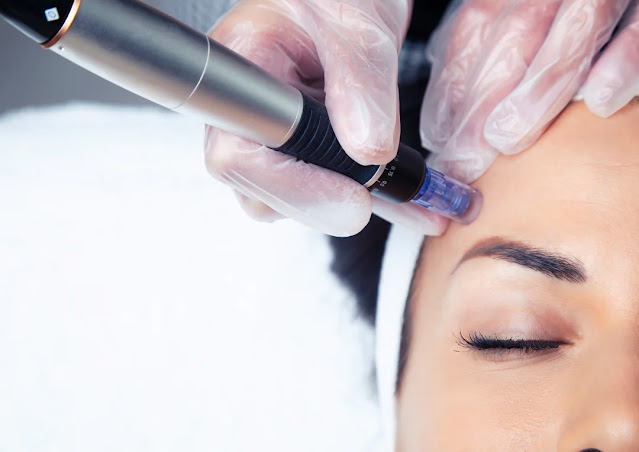The seedy world of black-market beauty products is sold at local stores but isn’t legal in the U.S. These are contraband items packaged in pretty jars or eyeliner containers that can contain dangerous levels of toxic ingredients, like lead in some eyeliners or mercury in some skin-lightening creams. Rumors about the latter began circulating on TikTok after a Minnesota woman lost her peripheral vision, which experts said may have been due to mercury in skin-lightening creams she had at home; high levels of mercury were found in her and her children’s urine.

The dangers of skin-lightening products are two-fold: “First, the idea that ‘whiter’ or lighter skin tones are more beautiful is harmful and can negatively impact society and a person’s self-esteem,” says Dr. Shereene Idriss, a board-certified dermatologist in New York. “Second, the creams themselves are dangerous. [Many] skin-lightening products are made by uncertified manufacturers [around the world] who use toxic ingredients like mercury in their products.”
The terms “skin lightening” and “skin whitening” are often used interchangeably when referring to skin-lightening products that are not approved for over-the-counter sale in the U.S. — and they are very different from traditional skin-lightening products that contain whitening ingredients like vitamin C that are commonly found on the mainstream market. “The FDA does not allow the use of mercury in drugs or cosmetics except in very specific circumstances where there are no other safe and effective preservatives — these products do not meet those conditions,” the FDA warned in a statement. “These products do not generally meet those conditions.” Promoted as a whitening and anti-aging treatment to remove age spots, freckles, blemishes, and wrinkles. Teens can use these products to treat acne. These products are often manufactured abroad and sold illegally in the U.S., often in markets in Latin America, Asia, Africa, or in stores in Middle Eastern communities. They are promoted online on social media sites and sold through mobile apps. Consumers can also buy them in another country and bring them back to the U.S. for personal use. “Over-the-counter skin-lightening products containing hydroquinone are also illegal: The FDA warned people in an April 2022 statement that “no over-the-counter skin-lightening products [containing hydroquinone] are FDA-approved or otherwise legally sold.” These harmful skin-lightening products. Even some products that bear the seemingly innocuous term “skin lightening” but are illegally sold in the United States may contain mercury, the FDA said in another statement: “Avoid products with handwritten letters, non-English labels, or no labels at all.” Such products violate FDA regulations and can be harmful.
Why do skin-lightening creams contain mercury?
Sometimes products are accidentally contaminated with dangerous ingredients during the manufacturing process, and then well-known brands voluntarily recall them. (Recent news reports include high-profile recalls of aerosol products that were accidentally contaminated with benzene, a known carcinogen.) However, skin-lightening creams contain mercury, most of which are manufactured abroad and illegally imported into the United States. And intentionally. Inorganic mercury is specifically used in these products because mercury can effectively inhibit the production of melanin, explains Dr. Ranella Hirsch is a board-certified dermatologist in Boston.
When used on the skin, inorganic mercury poses significant risks, including kidney damage, rashes, skin discoloration, scarring, reduced skin resistance to bacterial and fungal infections, anxiety, depression, psychosis, and peripheral neuropathy, according to the World Health Organization. Weakness, numbness, pain in the hands and feet) are among them.
Vision problems and lung damage are also potential risks, the FDA says. A 2014 study published in the journal Medical Science Monitor examined how mercury exposure can lead to vision loss, as well as peripheral vision loss. The study found that long-term exposure to mercury “has toxic effects on humans” “Long-term use of skin-lightening creams containing mercury is particularly dangerous,” says Dr. Idris. The more mercury accumulates in our bodies, the harder it is to get rid of it.
What is being done to control mercury levels in skin-lightening creams?
Many parts of the world, including Europe and Africa, have banned the use of mercury in cosmetics, while the United States has restrictions. The World Health Organization lists mercury as one of the ten chemicals of greatest public health concern. Arsenic, asbestos, and benzene are also affected.
Many countries are working to limit the use of mercury: In 2013, the Minamata Convention, set by the United Nations Environment Program, specified that the international limit for mercury in cosmetics should not exceed 1 part per million (ppm). As you might have guessed, it’s not just skin-lightening creams that can be contaminated with mercury; it’s also possible that mercury can be found in other cosmetics, such as eye makeup, eye makeup removers, and topical preservatives, the convention notes.
The FDA also adheres to this restriction: “Mercury compounds are permitted in cosmetics only as preservatives in eye products.” “They may only be used in very small quantities – the mercury content in the finished product must not exceed 65 parts per million (ppm) – and only when no other effective and safe preservative is available. Mercury is not permitted in other cosmetic products except at trace levels below 1 ppm and only when its presence is unavoidable under good manufacturing practices.”
The Minamata Convention, adopted by more than 140 countries, came into force in August 2017 but requires participating countries to stop the production, import and export of listed mercury-containing products, including cosmetics, by 2020.
By this logic, skin care products with mercury content above 1 ppm should have been phased out by now – at least in these 140 countries. But as far as we know, this is not the case.
Why are there still skin-lightening products containing mercury?
Although mercury-containing skin-lightening creams are largely banned, you can still buy them online and in some markets around the world, according to the World Health Organization. For example, one study found that one skin-lightening product produced in Jamaica, sold locally, and exported contained mercury concentrations 13,546 times higher than the FDA limit.
In March, a new study by the Zero Mercury Working Group (a coalition of non-governmental organizations in more than 55 countries working to reduce mercury pollution) found that skin-lightening products are still widely used around the world. The study tested 271 skin-lightening products sold on some of the world’s largest e-commerce platforms, of which 129 contained mercury levels above 1 ppm. The study showed that some e-commerce platforms did not appear to verify the legality of the products they were selling.
Therefore, the responsibility lies with the consumer. Unfortunately, it is not easy to avoid products with “mercury” in the ingredient list. Many manufacturers use synonyms for mercury in their ingredient lists, such as: B. “mercury”, “iodine mercury”, “mercury chloride”, “aminated mercury”, “mercury chloride amide”, “mercury”, “cinnabar” (mercury sulfide). “Hydrargyri oxydum rubrum,” “mercuric iodide,” and “poison”—yes, that’s the word. Of course, never use a product that has “poison” in the ingredient list.
But some products don’t even include an ingredient list—and that’s a big red flag. This is especially true for skin lighteners from uncertified manufacturers, which, according to Dr. Idris and Dr. Deer, are often sold at local stores, flea markets, neighborhood stores, and third-party sellers like Amazon.
How can we protect ourselves from mercury poisoning?
“You should avoid any mercury exposure in beauty products,” advises Dr. Idris. “You should only buy products from reputable brands and retailers. If you’re a smart consumer, you can avoid becoming a victim of one of these manufacturers.”
Dr. Hirsch agrees, and stresses the importance of buying reputable products from brands you trust. In the end, any brand that follows guidelines and regulations from the FDA and other government agencies should not exceed safe levels of mercury in its products.


